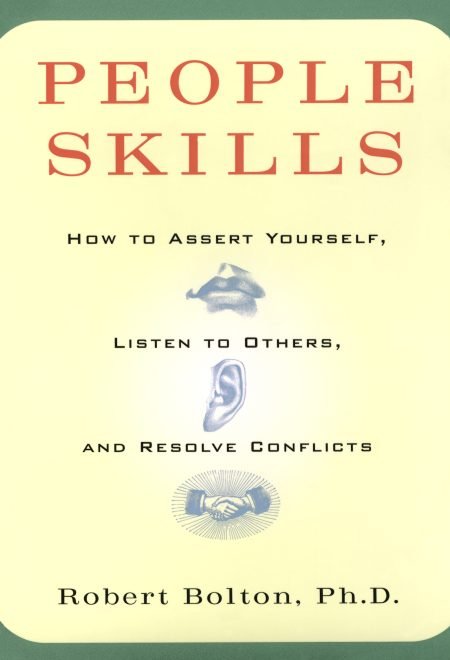articles
China Elevator Stories
People Skills: How to Assert Yourself, Listen to Others, and Resolve Conflicts (by robert bolton, ph.d.)
Many relationships end because of a lack of or poor communication.
20/09/2024

Ruth Silbermayr
Author
Communication has been a real problem these past few years. I’m wondering if it was the Covid-lockdowns, social media or people watching videos instead of talking to each other that made people more prone to becoming less good at communicating. Whatever it was, I have found that communication has been hard with mostly anyone, and real connection has been even harder to find, particularly after the Covid-lockdowns have started.
This doesn’t mean that people don’t communicate with each other, some (not all) do. But the communication I have experienced here in Austria was either very unhealthy, one-sided, based on projections, or not taking place at all. Some people also over-communicate, while saying nothing of essence at all.

In the book “People Skills: How to Assert Yourself, Listen to Others, and Resolve Conflicts”, Robert Bolton, Ph.D., calls communication humanity’s supreme achievement, and says the following about it:
“When one person communicates to another through the medium of language something takes place between them that is found nowhere else in nature. This ability to turn meaningless grunts into spoken and written words constitutes humanity’s most important distinction. Language has made possible the development of those characteristics that differentiate Homo sapiens from all other creatures. No wonder the German philosopher Karl Jaspers claims, ‘Man’s supreme achievement in the world is communication from personality to personality’.”
So why, then, does it feel like many people these days resemble hyenas that can’t use human language more than they remind me of Homo sapiens who can?
Robert Bolton, Ph.D., writes the following about the ability of a human being to communicate:
“Although interpersonal communication is humanity’s greatest accomplishment, the average person does not communicate well. One of the ironies of modern civilization is that, though mechanical means of communication have been developed beyond the wildest flight of the imagination, people often find it difficult to communicate face-to-face. In this age of technological marvels, we can bounce messages off the moon and land space probes on Mars, but we find it difficult to relate to those we love.
I have become increasingly aware of the inadequacy of most communication. In our society, it is rare for people to share what really matters – the tender, shy, reluctant feelings, the sensitive, fragile, intense disclosures. It is equally rare for persons to listen intently enough to really understand what another is saying. (…)
Ineffective communication causes an interpersonal gap that is experienced in all facets of life and in all sectors of society. Loneliness, family problems, vocational incompetence and dissatisfaction, psychological stress, physical illness, and even death result when communication breaks down.”
Communication matters in relationships. It’s not just about the words being spoken, but also about the act of communicating itself—an expression of love and connection. Of course, with some people, silence can feel like a relief. For instance, I often preferred my Chinese ex-husband’s silent treatment because, when he did speak, his words were verbally abusive and difficult to bear. His silent treatment, which could last for months, was sometimes a blessing because it spared me from his hurtful language.
That said, communication that flows smoothly is essential in any relationship. It shouldn’t be too much or too little—balance is key. I value real, kind, and honest communication. It’s this kind of meaningful exchange that strengthens bonds and fosters understanding.

These messages read:
My ex-husband: “Are you stupid? I don’t care about them? With which brain did you make that up that I don’t care?”
…
Him: “It’s best if you can keep your mouth shut, stop bothering me with this.”
________________
Calling me stupid is one of the less harmful things I have heard him say about me.
To some, communication doesn’t matter at all. One of the main factors why I separated from one man was his lack of real, kind communication (and behavior) towards me. Words came out of his mouth, but they had no meaning.
Listening is also a skill some of us could still practice a little more. Sometimes, there’s a huge imbalance in talking and listening between two people, and some men I have had to deal with have gone overboard in practicing excessive talking and forcing me to listen to them, without getting a break from their talking and without asking for consent first. These have usually been people who only talk about themselves, their own lives and their own egos and don’t care much about the needs of another person.
Communication boundaries are an important part of life in these instances, either when you are being shouted at, projected onto, insulted, or otherwise abused through communication. There are certain situations, though, where we can’t simply walk away.
Robert Bolton, Ph.D., explains:
“Many people today yearn for warm, positive, meaningful relatedness to others, but seem unable to experience it.”
I have experienced what others have experienced these recent years: Being excluded from my family and experiencing extreme loneliness and isolation.
As an introvert, I like peace and quiet, being on my own and spending time by myself, but being isolated and excluded from my natural social environment is not something I consider healthy and appreciate.
According to Robert Bolton, Ph.D.,
“there are two kinds of aloneness. Solitude can be a creative, joyous, full aloneness. But loneliness is a painful, dead, empty aloneness. Loneliness is being acutely aware of one’s isolation and alienation from others.”
He goes on:
“Several reasons have been given for the increased ache of loneliness in modern times. Materialism (finding one’s solace in things rather than in people), the mobility of people, uprootedness of families and the bureaucratic structure of organizations – these are just a few. I am convinced that another major cause of this interpersonal gap, and the one that may be easiest to rectify, is inadequate methods of interpersonal communication.
Unfortunately, the most intense loneliness today is often found in the family where communication is breaking down or is in a shambles. Marriage, the most complicated of human relationships, cannot flourish without effective communication. Couples hoping to establish an enriching marriage often lack the needed relational skills and end up living parallel lives in a marriage without intimacy.”
One of the issues mentioned in my divorce lawsuit by my lawyers as a main reason for divorce were my ex-husband’s frequent episodes of silent treatment. Because he was often verbally abusive, I was usually glad when he finally stopped opening his mouth. I am an introvert by nature, and I don’t like men who talk all the time, or men who don’t allow a woman to speak. But experiencing verbal abuse on a regular basis is also no fun and having it quiet was certainly preferrable to having him abuse me verbally.
In his book “People Skills: How to Assert Yourself, Listen to Others, and Resolve Conflicts”, Robert Bolton, Ph.D. goes on to write:
“When communication is blocked, love’s energy turns to resentment and hostility. (…) Healthy communication is vitally important in raising a family. For couples who have competence in communication skills, parenthood can be one of the most rewarding and joyous experiences of their lifetime. When parents have not mastered skills for accurate, congruent communication, the resulting anguish, alienation, and loneliness for parents and children alike can be devastating.”
Every person’s individual need for communication is different. Some may need a lot of communication, while others don’t. Some may need some communication, but not a lot, and others may need to communicate all the time, talk only about themselves and never lend a listening ear to their partner.
In a couple, communication should match each other’s needs. One man’s lack of communication, and in those instances where he did communicate, his lack of meaningful interaction, has been one of—if not the single most—important factors in my decision to end the relationship.
Sometimes he doesn’t communicate, and when he does, it’s like communicating with a hyena! I feel like I am texting with a hyena that has learned how to send messages on a smartphone but hasn’t learned how to speak in a coherent, sincere, and direct way that is understandable by a human being—one that focuses on solving problems or sharing meaningful conversations, rather than creating new issues.
Robert Bolton, Ph.D., also shares the view that not every kind of communication is healthy:
“Conversely, lack of communication or frequent exposure to poor communication diminishes one’s selfhood both emotionally and physically. (…) Deficient communication can affect a person’s physical health. The extent to which constructive or destructive dialogue influences bodily functions, however, comes as a surprise to many people.”
He shares an experiment Emperor Frederick was said to have ordered to be undertaken with infants:
“Emperor Frederick, the thirteenth-century ruler of the Holy Roman Empire, wanted to know what language had been spoken at the birth of mankind in the Garden of Eden. Was it Hebrew, Greek, or Latin? He ordered an experiment in which the original circumstances would be re-created as closely as possible. A group of infants were to be isolated from hearing human speech from the moment of birth until they spoke their language. The babies were to be raised by wet nurses who were strictly charged to maintain complete silence when with the babies. All the conditions of the experiment were successfully carried out. The result? Every one of the babies died. The lack of communication is often toxic and can be lethal.”
We know from documented events that similar experiments were carried out with infants during WWII, which also resulted in the infants dying.
Not only is a lack of healthy and loving communication harmful for infants—it is also damaging for older children. For a child, regular and loving communication with their parent allows them to feel comfortable and at ease. When communication doesn’t take place because the other parent or a grandparent doesn’t allow it, this often causes depression or anxiety in the child.
I found Dr. Robert Bolton’s book not only insightful but also funny, and I highly recommend reading it.
Have you ever had to end a relationship because of poor communication?